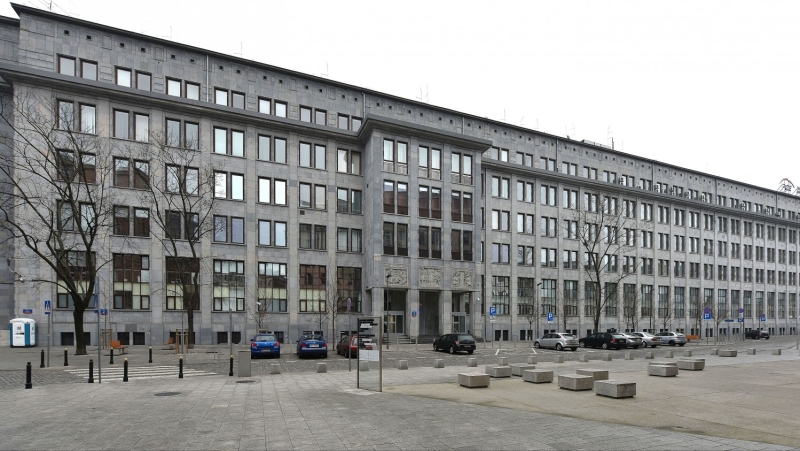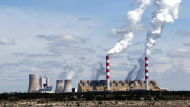Company – On record
This profile is no longer actively maintained, with the information now possibly out of dateBankTrack
climate@banktrack.org

Company – On record
This profile is no longer actively maintained, with the information now possibly out of dateBankTrack
climate@banktrack.org
Why this profile?
Polska Grupa Energetyczna (PGE) is the EU's number 3 top CO2 emitter. 91% of PGE’s energy is generated from lignite and hard coal, higher than any other major European utility. The company negatively impacts the environment, human health and climate change due to its coal-fired energy generation and coal mining extraction. PGE is tracked as part of the Europe Beyond Coal campaign. PGE targets to phase out its coal-fired power station fleet by 2040-2045.
| Sectors | Coal Electric Power Generation , Biomass Electric Power Generation, Coal Mining, Nuclear Electric Power Generation |
| Headquarters |
|
| Ownership |
listed on Warsaw Stock Exchange
PGE is a majority state-owned company with the Polish State Treasury holding 57.39% of the shares. PGE's complete shareholder structure can be accessed here. |
| Subsidiaries |
|
| Website | http://www.pge.com |
PGE Polska Grupa Energetyczna, the parent company of the PGE Capital Group, is the largest producer of electricity and heat in Poland. As of 2019, the company has a 39% market share in energy generation. Its generation is 96% fossil fuel-based. PGE owns a series of conventional power plants, including the lignite-fired Turow power plant and Europe’s single biggest CO2 emitter: the Belchatów power plant. The company owns two large lignite mines where 43 million tonnes per year of lignite is mined. In total, PGE accounts for approximately 87% of Poland's lignite extraction. Besides lignite, PGE uses hard coal, gas and biomass in its generation processes.
Social and human rights impacts
Polska Grupa Energetycza (PGE) is largely fossil-fuel based, with coal as its core source of energy. The company's hard coal and lignite plants accounted for 89% of its total generation. The use of coal-fired power plants negatively impacts human health, the environment and climate change. Coal-fired energy generation causes air pollution, which can affect people's health. Health issues that arise are illnesses (like bronchitis and asthma), but they can also result in premature deaths. Due to the health impacts of coal, considerable costs are created as well. In 2016, the total modelled premature deaths due to the air pollution caused by PGE’s operational coal power plants were 1,179 (median) people. The costs of health impact were estimated at EUR 1.789 billion. These costs are not covered by the coal sector, but are borne by society.
According to a 2016 report, Polish coal plants cause the most health damage in the EU and have caused 5,800 premature deaths across the EU. Of these deaths, 1,100 occurred in Poland. Moreover, the most damaging plant to human health in the EU, the coal power plant Belchatow, is owned by PGE.
PGE is targeting phasing out its coal-fired power station fleet by 2040-2045.
Environmental and climate impacts
As mentioned, coal pollution also negatively affects the climate. Coal-fired power generation processes emit greenhouse gases and therewith directly contribute to climate change. About two-thirds of PGE’s investments are still in hard coal and lignite and as recently as 2016 PGE acquired EDF’s coal assets, adding 3.3 GW of coal capacity.
As reported in Europe's Dark Cloud, Polish coal plants are the worst CO2 emitters of the EU. Unsurprisingly, Poland is struggling to meet the European air pollution requirements. The worst CO2 emitter of the EU is the lignite-fired plant, Belchatow, which is owned by PGE. This plant emitted almost 38 milion tonnes of CO2 in 2017.
As reported by IEEFA, PGE is facing enormous pressure regarding the stricter standards on air pollution that will come into effect in 2021. The company is majority state-owned, and the Polish government is backing the use of coal. However, as market forces are shifting, the government is now facing economic pressures.
PGE finances include debt finance in the form of bonds and loans from commercial banks and development banks EBRD and EIB. PGE lists its most important available financing here; financial institutions involved are listed below.
Dated February 2020, the following banks held shares and/or bonds in PGE: Crédit Agricole, Deutsche Bank, UBS, DZ Bank, BNP Paribas, Santander, HSBC, Skandinaviska Enskilda Banken, Credit Suisse, KBC, PKO Bank Polski and Bank Pekao. For more details see Annex II on page 36-39 of the Fool's Gold report 2020.
In September 2018 PGE signed a EUR 950 million loan agreement with Intesa Sanpaolo, MUFG, Banco Santander and PKO Bank.
From 2014-2017, nine financial institutions loaned a total of USD 1.875 billion and provided underwriting services totalling USD 1.733 billion to PGE. These are specified below.
2019
2019-08-27 00:00:00 | PGE abandons proposed Gubin-Brody lignite mine
Polska Grupa Energetyczna (PGE) has abandoned plans for the proposed Gubin-Brody lignite mine after a decade-long campaign against the project by local residents and Greenpeace Poland. The proposed open-cut lignite mine would have displaced up to 3,000 people and destroyed 15 villages and agricultural land. In a referendum in 2009 a majority of voters opposed the project while over 7,000 people attended an August 2014 rally against the plan. In 2016 environmental regulators found major deficiencies in the company’s environment assessment and allowed up to three years for the deficiencies to be addressed. At the expiry of the three years, the Regional Director for Environmental Protection announced the application for the project has lapsed.
2019-03-05 00:00:00 | Legal challenge of PGE's Zloczew coal mine by Polish NGO ClientEarth
Approval for a huge new coal mine that would leave 3,000 people in search of new homes is being challenged by ClientEarth’s lawyers in Poland. The Zloczew open-cast mine would be Poland’s deepest ever and, for the first time, use explosives to access the lignite (the dirtiest form of coal) beneath the surface. This project of state-owned energy company PGE, would result in the displacement and destruction of 33 villages, including highly specialised modern farms, homes, schools, shops, chapels and fire stations.
2018
2018-09-17 00:00:00 | PGE signs EUR 950 million credit facility
In September 2018 PGE signed a EUR 950 million loan agreement with Intesa Sanpaolo, MUFG, Banco Santander and PKO Bank.





